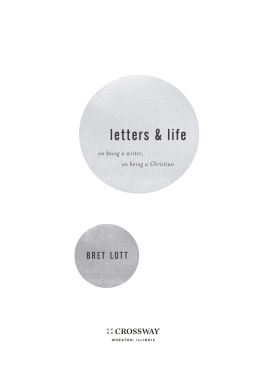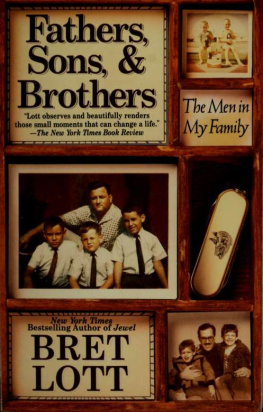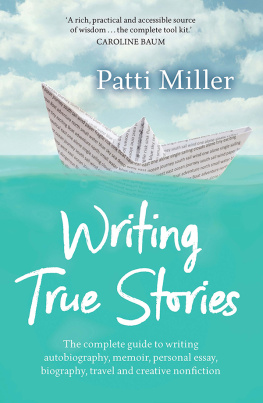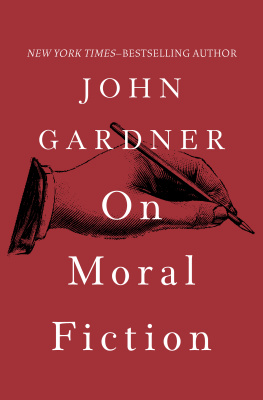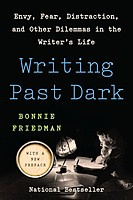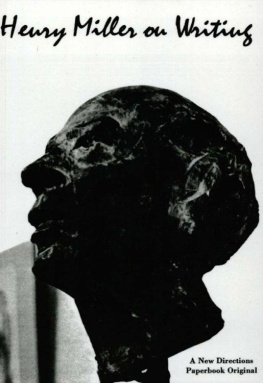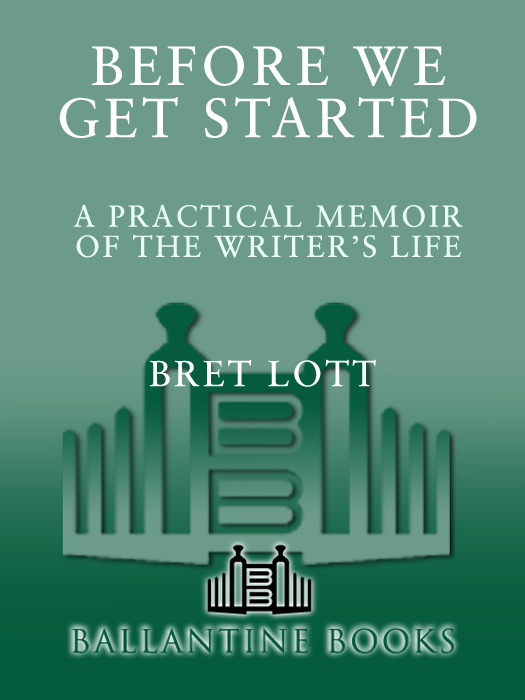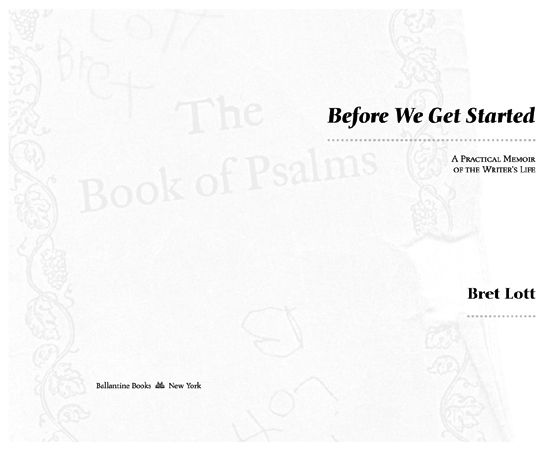A LSO BY B RET L OTT
The Man Who Owned Vermont
A Strangers House
A Dream of Old Leaves
Jewel
Reeds Beach
How to Get Home
Fathers, Sons, and Brothers
The Hunt Club
A Song I Knew by Heart
Copyright 2005 by Bret Lott
All rights reserved.
Published in the United States by Ballantine Books, an imprint of The Random House Publishing Group, a division of Random House, Inc., New York.
Ballantine and colophon are registered trademarks of Random House, Inc.
Grateful acknowledgment is made to the following for permission to reprint previously published materials:
Atria Books, an imprint of Simon & Schuster Adult Publishing Group: Excerpt from Reeds Beach by Bret Lott. Copyright 1993 by Bret Lott. Reprinted by permission of Atria Books, an imprint of Simon & Schuster Adult Publishing Group, New York.
An excerpt appears in this work from A Strangers House by Bret Lott, copyright 1987 by Bret Lott (New York: Viking, a division of Penguin Group [USA], Inc., 1987).
Library of Congress Cataloging-in-Publication Data
Lott, Bret.
Before we get started: on writing / Bret Lott.
p. cm.
eISBN: 978-0-307-80480-8
1. Lott, Bret. 2. Novelists, American20th century
Biography. 3. English teachersUnited StatesBiography.
4. EditorsUnited StatesBiography. 5. Lott, Bret
Authorship. 6. Authorship. I. Title.
PS3562.O784Z463 2005
813.54dc22 2004056802
[B]
Ballantine Books website address: www.ballantinebooks.com
v3.1
For my students
Of making many books there is no end,
and much study wearies the body.
E CCLESIASTES 12:12
Stare. It is the way to educate your eye, and more.
Stare, pry, listen, eavesdrop.
Die knowing something. You are not here long.
W ALKER E VANS
Contents
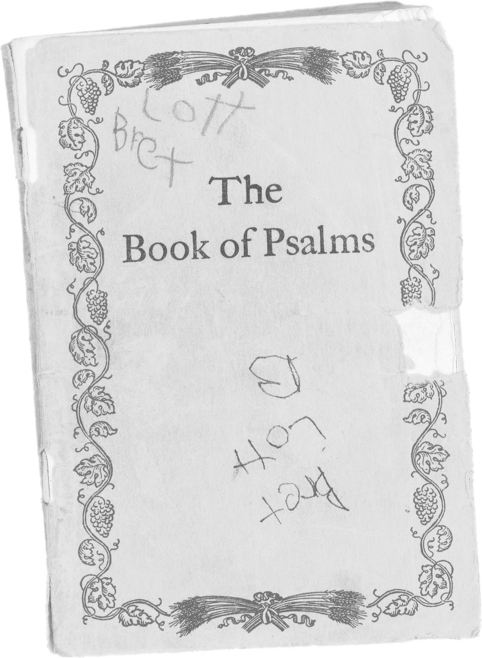
Genesis
I am sitting in the sanctuary, a few rows from the front, to my left my mom and dad, my little brother, Timmy, in Moms lap and sleeping, to my right my older brother, Brad. Brad and I have just received these thin blue books, every kid in the service passed a brand-new copy by men in gray or black suits standing at either end of the pews, stacks of these books in hand.
The blue paper cover is bordered with green grapevines, tendrils working up and down either side with bunches of grapes here and there; at the top and bottom of the cover those tendrils meet sheaves of wheat in the same green ink.
The pastor says it is the book of somms, and I wonder what that is, look at the words in black ink centered a little high on the cover. I sound out the words to myself, The Book of, and stop.
P-S-A-L-M-S. How does that, I wonder, spell out Somms?
But even if I dont understand, this is the first Bibleor piece of itI have ever gotten, and I dont want to lose this book. I want to keep it.
So I take one of the nubby pencils from the back of the pew in front of me, nestled in its tiny wooden hole beside the wooden shelf where attendance forms are kept, and beside the larger holes where the tiny glass cups are placed once weve emptied them of grape juice.
And I begin, for the first time in my life, to write my name by myself.
I start at the upper-left-hand corner, just below the border, but the first word trails off, falls toward that centered title in black as though that title is a magnet, the letters I make iron filings. They fall that way because there are no lines for me to balance them upon, as I am able to do with the paper given me by my kindergarten teacher, Mrs. Pasley.
I finish that first word, feel in my hand the cramp of so much strenuous, focused work, and hold the book away from me, look at it while the pastor rolls on.
There is no place for the second word, I see, the last letter of my first name too near the first of the title.
This is a problem. I know the second word must follow the first on the same line, a little space needed between them. Mrs. Pasley would not approve. This is a problem.
But there is space above my name due to its falling away, a wedge of blue field that might, if I am careful enough, be able to hold that second word, and I write, work out the riddle of letters without lines, letters that will line up to mark this book as mine, and mine only.
Then I am finished, and here is my name. Me.
The first time I have ever written my name myself, alone.
Later, on the way home, my older brother, Brad, will look at the book, say, Lott Bret. Whos that? and laugh at my ill-spaced effort. Later still I will write my name again on the cover, this time with a blue pen and holding the book upside down. The words will be a little more jaunty, full of themselves and the confidence of a kid who knows how to write his name, no problem at all. Beneath this second round, though, will be the lone letter B, a practice swing at making that capital letter as good as I can make it.
Later, I will be baptized into the church at age fourteen, a ritual it will seem to me is the right thing to do.
Later still, in college, I will be born again, as Christ instructed Nicodemus.
And later even still, I will have written entire books of my own, created lives out of the whole cloth of the imagination. I will have created, and created in my name.
But on this Sunday, the pastor still rolling on, these two words themselves are enough.
Only a kids scrawl. My own small imitation of God.
Before We Get Started
Let me begin this book on the nature and aim of words by saying that I wont be talking about those glamour words we all get to use now and again, the ones that set our pride spinning at our actually using in a sentence. Abrogate was one of those words I used that, once Id actually employed it correctly in a sentence, made me lean back and put my hands behind my head, kick my feet up on the desk, and beam at my intelligence. Another one I love is the word limn, which Ive used a number of times for what I hope was good effect. Once, in a review of a perfectly dreadful novel that centered on hidden incestuous relationships, I had the great good fortune of putting together the phrase the most Byzantine jamboree of family flesh possible. That was a glorious occasion, I remember, and I remember, too, me smiling at the monitor for a good five minutes about that. Byzantine jamboree. That was fun.
But I wont be talking about those words here. The kind of words Im talking about are those trench-warfare words, those grunt-work words we oftentimes dont give a second thought because we traffic in them day in and day out, truck them in and off-load them like they were so many yards of gravel being used to rough-pave the road for the brilliant parade of paper floats our ideas and ambitions and intellect will be once this story is done.
Byzantine jamboree. Man, that was fun.
No. Ill be talking about a, the, and this. Those few small words we couldnt care less about because they are, like the poor, always with us.


